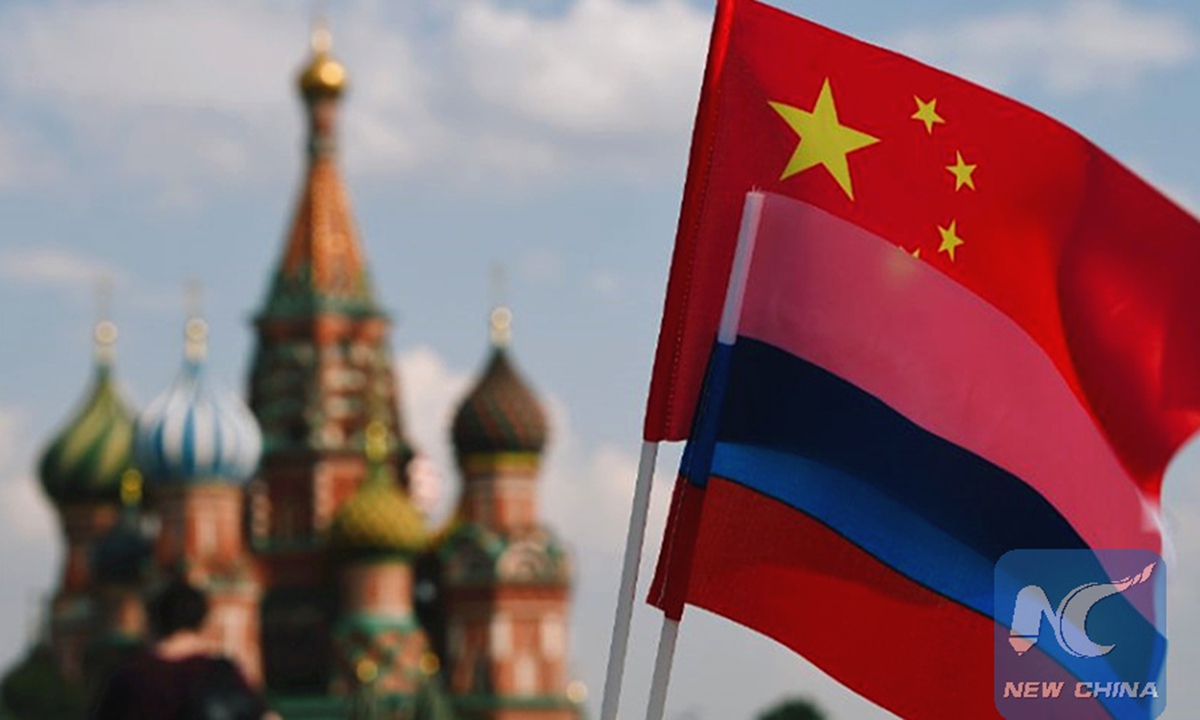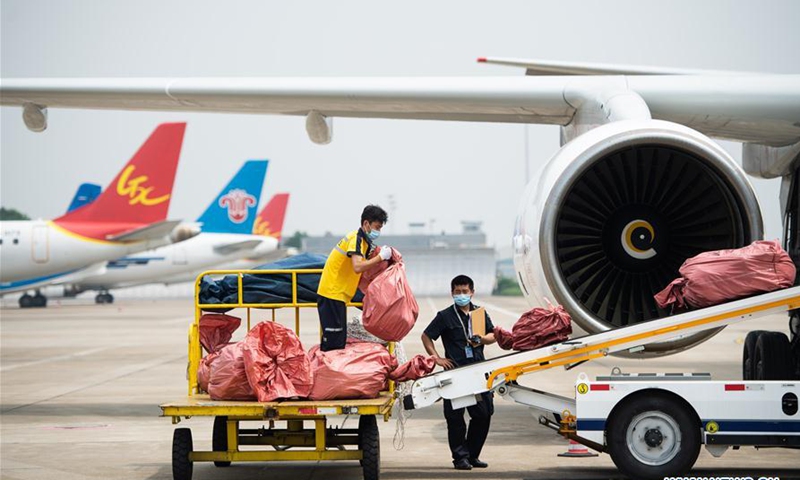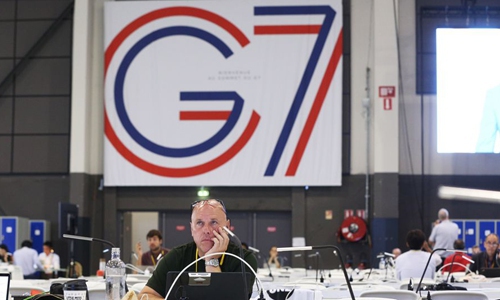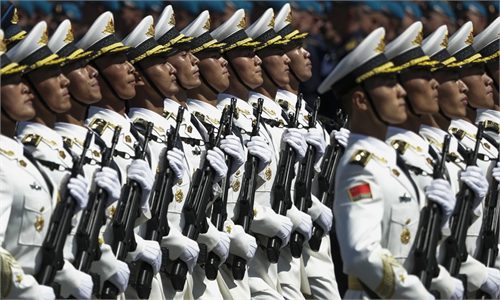
Photo: Xinhua
Chinese and Russian leaders exchanged support for each other on safeguarding sovereignty and security and opposing external intervention during a Wednesday phone conversation, which covered issues such as China's newly adopted national security law for Hong Kong and Russia's recently passed amended constitution.
Analysts said that the two big powers' maintaining their core interests with each other's support is a symbol of "mutual trust and strategic cooperation." They noted that although the US has been trying to interfere, Russia has shown that it gives priority to the China-Russia ties, which will not be shaken by small waves, as what happened in the past.
Chinese President Xi Jinping said on Wednesday during his telephone conversation with Russian President Vladimir Putin that the Chinese side is willing to continue working with the Russian side in firmly supporting each other, and rejecting external sabotage and intervention, the Xinhua News Agency reported.
Xi said China is ready to keep working with Russia to preserve their respective rights of sovereignty, security and development, and will safeguard their shared interests.
Putin said that Russia firmly supports China's efforts to safeguard national security in the Hong Kong Special Administrative Region. He said the Russian side opposes all kinds of provocative actions that violate China's sovereignty, and believes China is fully capable of ensuring long-term prosperity and stability in Hong Kong.
Putin said that Russia recently passed the amended constitution with high votes, which will serve to maintain long-term political stability in Russia and better safeguard national sovereignty and oppose external interference.
He noted that both China and Russia value their sovereignty and security, and firmly support each other.
Xi also said that China will, as always, firmly support Russia's development path that fits its own national conditions and staunchly support Russia in accelerating its development and revitalization.
This was the fourth telephone conversation between Xi and Putin this year.
Expressing support for each other on international and domestic matters is a symbol of China-Russia high-level mutual trust and strategic cooperation, Yang Jin, an associate research fellow at the Institute of Russian, Eastern European and Central Asian Studies under the Chinese Academy of Social Sciences, told the Global Times on Wednesday.
"China's national security legislation for Hong Kong and the Russian Constitution amendment are the significant domestic events for the two countries. These two events have reflected the real will of the people, and went through the legitimate and democratic processes of the two countries, but both received groundless and irresponsible criticism from the West," Yang said.
The top leaders of China and Russia would assure that the bilateral relations run smoothly. Their conversation shows the two countries support each other's core interests, Cui Heng, a post-doctorate researcher at the Centre for Russian Studies of East China Normal University, told the Global Times on Wednesday.
"When the external pressure becomes heaviest unprecedented, China-Russia relations serve as a stabilizer," he said.
China and Russia have supported and defended each other against unreasonable attacks and slander by certain countries since the outbreak of the novel coronavirus, forging an impregnable fortress against the "political virus," Chinese State Councilor and Foreign Minister Wang Yi said at a press conference on the sidelines of the annual national legislative session on May 24.
Putin on Friday signed a decree on the official publication of the country's amended constitution after it was approved in a referendum. The amendments take effect on July 4. Under the updated constitution, Putin will be allowed to participate in the 2024 presidential race, while more power will be given to the parliament, according to Xinhua.
Chosen with trust
China and Russia are providing significant international support from major global powers to each other as they are facing the same threats from the West, Yang said, adding that although the US is trying to attract Russia to join its campaign to isolate China, Putin is very clear that the West is never trustworthy.
The Trump administration is planning to hold a "G7+" summit in Washington and invite non-G7 countries, including Russia, to discuss international affairs. This includes how to deal with China in the future. But Russia has rejected the invitation, and Germany even said it won't attend the summit.
Russian Deputy Foreign Minister Sergei Ryabkov on Saturday said that the idea of holding an expanded G7 summit is flawed, since it is impossible to discuss any issues in the modern world without China, TASS reported.
Yang said according to the historical memories and experiences of Russian leaders, they knew the US or the West makes only empty promises, and Russia has been betrayed many times after the Cold War.
"The sanctions imposed by the West against Russia after the Crimea incident remain, so how could Putin choose to join the West to isolate China? Because of the common threats and mutual needs, as well as the current structure of international relations, China-Russia ties are unshakable and unbreakable," Yang noted.

Staff put the parcels from the cross-border e-commerce businesses onto a conveyor belt at the Changsha Huanghua International Airport in Changsha, central China's Hunan Province, May 28, 2020. An airplane carrying almost 40,000 parcels from the cross-border e-commerce businesses departed from Changsha to Moscow, Russia on Thursday. This was the maiden flight of the regular freight air route on the cross-border e-commerce to Russia, signifying the operation of such a route in Hunan. Operated three times a week, the route will serve as a direct link between the e-commerce businesses to Russian consumers, which will shorten the delivery time of commodities made in Hunan from previously over 20 days to about 10 days. (Xinhua/Chen Sihan)
Small waves
Though there have also been small waves in China-Russia relations, analysts said these episodes will not interfere in the strategic cooperation between China and Russia, as the two countries share support for and from each other, from top-level to people-to-people exchanges.
On July 2, the Russian Embassy in China made an online post to celebrate the 160th anniversary of the founding of its Far East port city Vladivostok on its Sina Weibo account. The post noted that the word "Vladivostok" means "ruling the orient."
The post triggered controversy on Chinese social media, as Vladivostok was a part of China and was handed over to the Russians via the Treaty of Peking in 1860 during the Qing Dynasty (1644-1911).
The embassy removed the post but republished it without explaining the meaning of the city's name.
Moreover, in February when the COVID-19 epidemic was still severely hitting China, some Chinese citizens just arriving in Russia were "forced into quarantine" at a rehabilitation center in Moscow, and some were expelled from the country for breaking the self-quarantine rule without fully understanding it. The event also resulted in some outrage online, calling local administrators treating Chinese "rude."
However, when Russia was hit by the epidemic later, Chinese nationals in Russia who were infected with the disease said that they were taken good care of by Russian medical staff and hospitals.
Analysts noted that Western media outlets have been hyping and enlarging differences between China and Russia, and they're happy to pick out any tiny crack in the China-Russia ties. However, China and Russia have been proving and reaffirming their mutual support of each other's core interests, contrary to Western media's expectation.
China and Russia show firm support for each other in fighting the COVID-19 pandemic. As early as February 5, a Russian military cargo plane loaded with aid supplies arrived in Wuhan, Central China's Hubei Province, that was fighting a severe outbreak, together with five Russian virus-prevention experts. When the epidemic raged in Russia, China also sent medical supplies to Russia. China sent a medical aid expert team to Russia in April to help the country fight the virus.
The two countries are also working together on developing vaccines for the COVID-19.
Wang Wenwen contributed to the story




